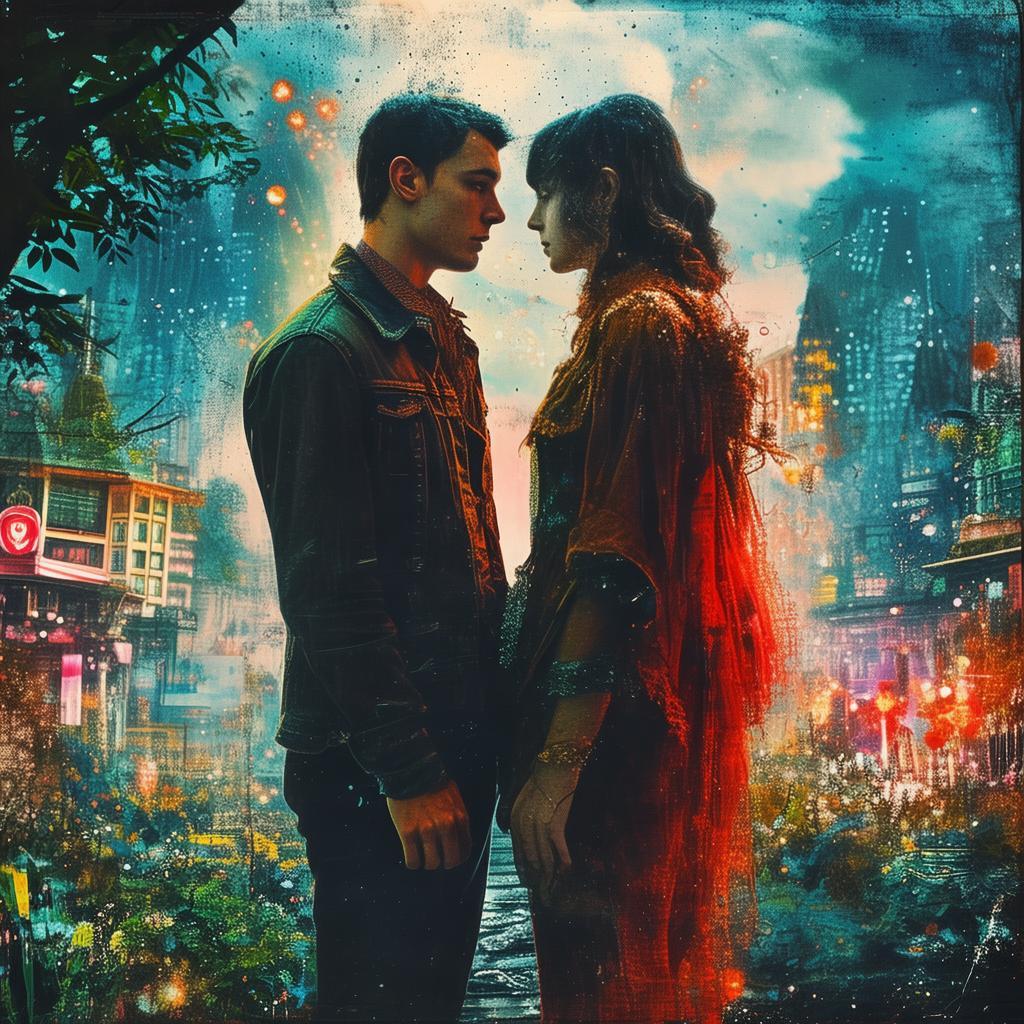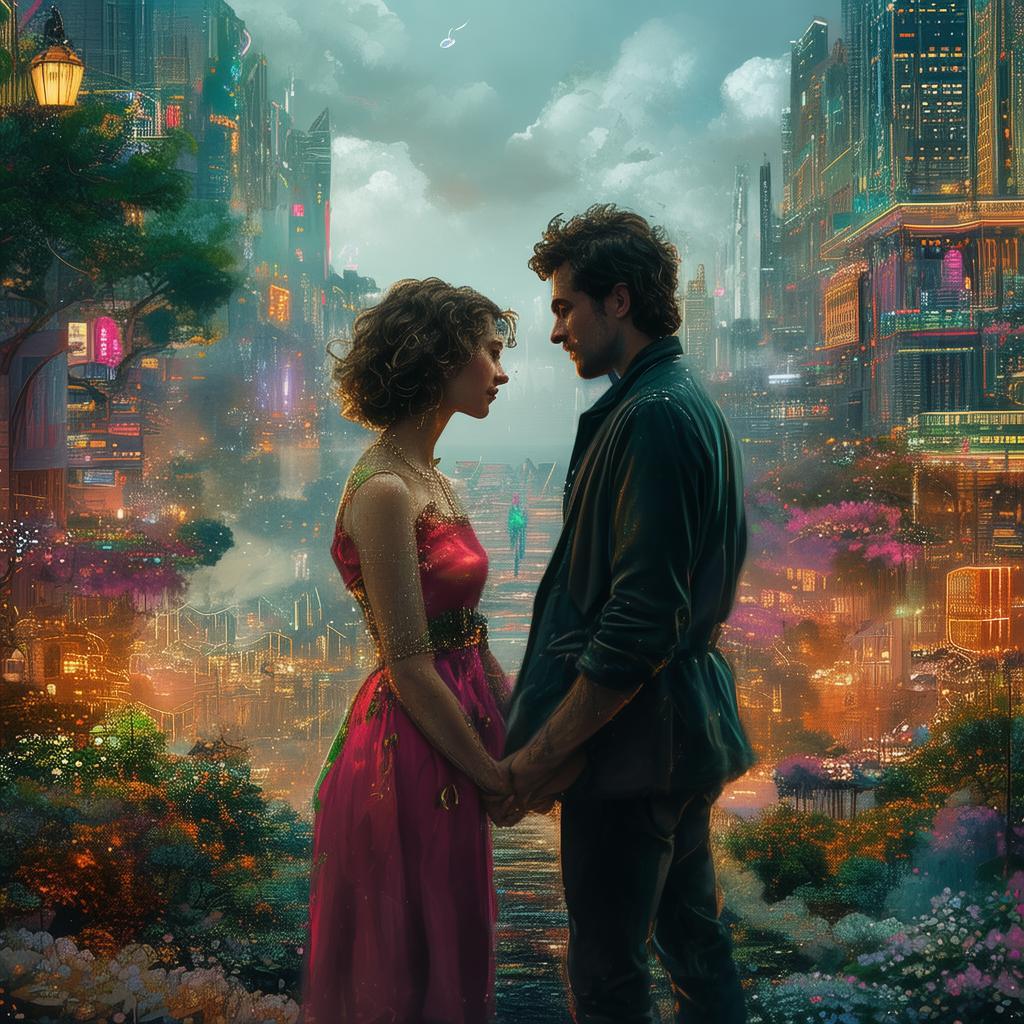The Virtual Love Triangle: Akihabara's Reality War
In the heart of Akihabara, the electronic district of Tokyo, where neon lights and holographic advertisements dance in the night air, lived three individuals whose lives were as intertwined as the circuits of their favorite gadgets. They were bound not by blood, but by a shared passion for the virtual world—a world where they could escape the mundane, where they could be someone else, someone better.
Kaito was a software engineer, his fingers dancing over his keyboard as he coded the latest virtual reality game. He lived for the thrill of creation, for the moment when his digital world would come to life. But beneath the surface of his tech-savvy exterior lay a heart that yearned for connection, for something real.
Yumi was a graphic designer, her art a reflection of her vibrant personality. She loved the virtual world for its boundless creativity, but she also sought solace in its escapism. In the digital realm, she could be anyone she wanted to be, and that was a freedom she cherished.
Ryota was a gamer, his avatar a warrior clad in armor, his skills unmatched. In the virtual world, he was the king, the hero. But in reality, he felt like a pawn in a game he couldn't win.
Their paths crossed in the virtual reality of "Elysium," a game that promised to be the ultimate escape. Kaito's creation, Yumi's designs, and Ryota's prowess made "Elysium" a sensation. They became the trio behind the game's success, their names becoming legendary among the players.
But as the game grew, so did the tension between them. Kaito and Yumi shared a secret love, a love that flourished in the shadows of the virtual world. Ryota, however, was oblivious to their feelings, his focus on the game and his avatar, the warrior king.

The virtual world was a mirror, reflecting their desires and fears. Kaito's code allowed Yumi to see the world through his eyes, to feel the thrill of his creation. Ryota, on the other hand, used the game to hide from his own insecurities, from the reality that he was alone.
As the game's popularity soared, so did the stakes. Kaito found himself caught between his love for Yumi and his loyalty to the game. Yumi grappled with the fear that her love was just a mirage, a construct of pixels and code. And Ryota, the warrior king, was becoming increasingly desperate to prove his worth in the virtual world, his actions bleeding into the real one.
One day, a hacker broke into "Elysium," releasing a virus that threatened to destroy the game. Kaito, determined to save his creation, worked tirelessly to find a solution. Yumi, unable to bear the thought of losing Kaito, offered her help, her skills in graphic design proving invaluable.
Ryota, feeling left out, decided to take matters into his own hands. He used his gaming skills to infiltrate the hacker's network, only to discover that the hacker was none other than his own avatar, the warrior king, who had been corrupted by the power of the game.
The revelation shattered the illusion of the virtual world. Kaito realized that the game had become more important to him than the people he loved. Yumi saw that her love was genuine, but it was too late. Ryota, humbled by his actions, tried to make amends, but the damage had been done.
The virtual love triangle had become a reality war, and the stakes were higher than ever. Kaito, Yumi, and Ryota found themselves in a battle for their identities, for their very existence. The game was a battleground, and they were the soldiers, fighting for survival.
As the virus spread, the virtual world began to mirror the real one. The lines between the two became blurred, and the characters inside "Elysium" had to face the consequences of their actions. Kaito had to choose between his love for Yumi and his loyalty to the game. Yumi had to decide if she could trust Kaito again. And Ryota had to confront the reality that his power in the game was a reflection of his own powerlessness in the real world.
In the end, the virtual love triangle became a reality war that tested the limits of their love, their trust, and their identities. The game was a mirror, reflecting the truth of their lives, and the choices they made would determine their fate.
Kaito chose Yumi, realizing that the virtual world was just a placeholder for the real one. Yumi forgave Kaito, understanding that love is not about the game, but about the person you love. And Ryota learned that power comes from within, not from the armor of an avatar.
The virus was contained, and "Elysium" was saved, but not without a cost. The game had changed them, and they had changed the game. The virtual love triangle had become a reality war, and in the end, it was their love, their courage, and their willingness to face the truth that won the day.
The virtual world had been a place of escape, but now it was a place of growth. Kaito, Yumi, and Ryota had emerged from the game not as avatars, but as people, with all the flaws and strengths that came with being human. And in the heart of Akihabara, where the neon lights still danced, they found a new beginning, one that was as real as the world around them.
✨ Original Statement ✨
All articles published on this website (including but not limited to text, images, videos, and other content) are original or authorized for reposting and are protected by relevant laws. Without the explicit written permission of this website, no individual or organization may copy, modify, repost, or use the content for commercial purposes.
If you need to quote or cooperate, please contact this site for authorization. We reserve the right to pursue legal responsibility for any unauthorized use.
Hereby declared.









